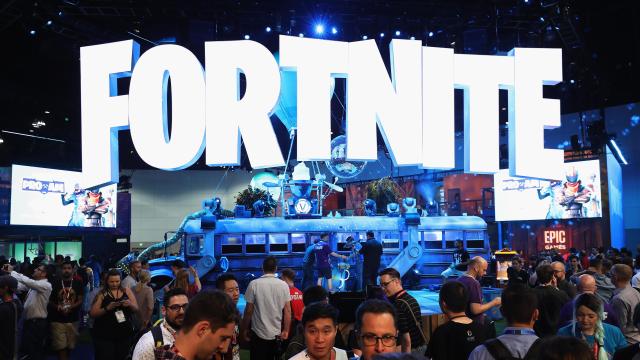Fortnite-maker Epic Games has agreed to pay a massive $US520 ($AU776) million fine in settlements with the Federal Trade Commission for allegedly illegally gathering data from children and deploying dark patterns techniques to manipulate users into making unwanted in-game purchases. The fines mark a major regulatory win for the Biden administration’s progressive-minded FTC, who, up until now, had largely failed to deliver on its promise of more robust reinforcement of U.S. tech companies.
The first $US275 ($AU410) million fine will settle allegations Epic collected personal information from children under the age of 13 without their parent’s consent when they played the hugely popular battle royale game. The FTC claims that unjustified data collection violates the Children’s Online Privacy Protection Act. Internal Epic surveys and the licensing of Fortnite branded toys, the FTC alleges, show Epic clearly knew at least some of its player base was underage. Worse still, the agency claims Epic forced parents to wade through cumbersome barriers when they requested to have their children’s data deleted.
The FTC additionally took shots at Epic’s default privacy settings, which turn live voice and text communication on by default. That default settling allegedly led to children being linked up with teens and strangers online, who, in some cases then exposed the underage users to bullying, harassment and, “psychologically traumatising issues,” including suicide. Employees at Epic allegedly expressed concern over harms stemming from that default privacy setting dating back to at least 2017. Despite those concerns, Epic still refused calls to make voice and text communication opt-in.
“No developer creates a game with the intention of ending up here,” Epic said in a statement acknowledging the fines. “The video game industry is a place of fast-moving innovation, where player expectations are high and new ideas are paramount. Statutes written decades ago don’t specify how gaming ecosystems should operate.”
“We accepted this agreement because we want Epic to be at the forefront of consumer protection and provide the best experience for our players.”
Though bad enough on its own, the child privacy violations were only part of Epic’s problem. The game-maker additionally agreed to pay $US245 ($AU365) million to refund customers who the FTC says fell victim to manipulative, unfair billing practices that fall under the category, “dark patterns.” Fortnite allegedly deployed a, “counterintuitive, inconsistent, and confusing button configuration,” that led players to incur unwanted charges with a single press of a button. In some cases, the FTC claims that single press button meant users were charged while sitting in a loading screen or while trying to wake the game from sleep mode. Users, the complaint alleges, collectively lost hundreds of millions of dollars to those shady practices. Epic allegedly “ignored more than one million user complaints,” suggesting a high number of users were being wrongly charged. Now that $US245 ($AU365) million payout from Epic will be used to refund customers who lost money.
“All game developers should rethink steps they’ve taken to simplify payment flows in favour of practices that provide the largest amount of clarity to players when they make purchase decisions,” Epic said in response to the dark patterns fine. “Saving payment information by default is a common way to streamline the checkout process, so players do not have to re-enter their payment method every time they make a purchase. We’ve agreed with the FTC to change this practice, and we now offer an explicit yes or no choice to save payment information.”
In a statement, FTC chair Lina Khan said she wanted the fines, some of the largest in the agency’s 108 year history, to make clear the agency’s intent to vigorously pursue violations.
“Protecting the public, and especially children, from online privacy invasions and dark patterns is a top priority for the Commission, and these enforcement actions,” Khan said.
And though the FTC’s latest fine is far cry from the $US5 ($AU7.46) billion penalty the agency issued against Facebook in 2019 and represents just a portion of the billions Fortnite reportedly rakes in each year, supporters said it nonetheless represents more than a mere slap on the wrist.
“This agreement is not a parking ticket — it’s a clear demonstration of the FTC’s full-throated commitment to protecting children online and ending the use of dark patterns,” American Economic Liberties Project Executive Director Sarah Miller said in a statement. “By securing both the largest fine and refund in the Commission’s history, the agency is showing once again that laws are not suggestions — especially when kids’ well-being is on the line.”
